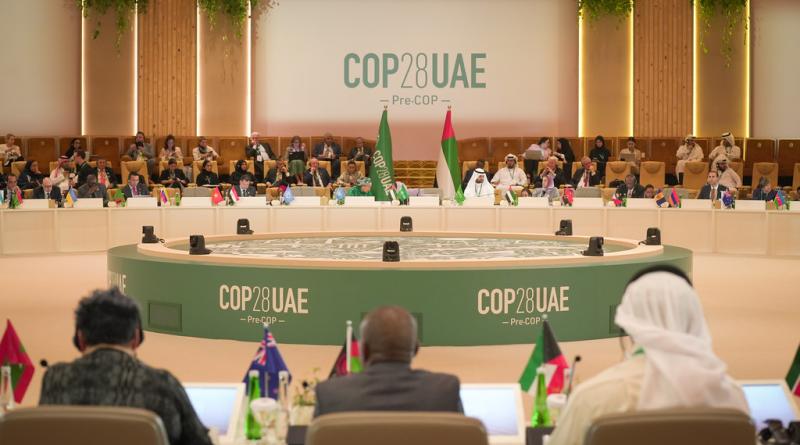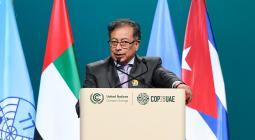Global Stocktake Q&A: What’s at stake for Africa at COP28?

The COP28 climate talks in Dubai will see the first ever Global Stocktake. This five-yearly exercise could galvanise action or it could prompt mere empty promises. Olivia Rumble, a climate change policy and legal specialist and a Director at Climate Legal, spoke to our climate editor James Wan about what the Global Stocktake might mean for Africa, the points of contention, and what might emerge from the negotiations.
In the run-up to COP28, we are publishing explainers with experts outlining the issues of importance for African countries in the negotiations. See more here.
What is the Global Stocktake?
The Global Stocktake (GST) is a five-year inventory of where countries are when it comes to achieving the goals of the Paris Agreement, the landmark pledge by countries in 2015 to accelerate actions to reduce carbon emissions and adapt to climate change. The Global Stocktake at COP28 in Dubai will be the very first.
The Stocktake will take the form of a series of high-level events at COP. These will formally present findings and outputs from the technical assessment that was concluded earlier this year. There will also be a formal “Outcomes” document, which may take the shape of a formal COP decision and/or a political declaration.
Why the Global Stocktake important and contentious?
Legally, the Global Stocktake is a mandated process of the Paris Agreement. As such, its outcome arguably has greater weight than other decision texts coming out of COPs in terms of its findings and guidance for future action. It is also unique in that it seeks to acknowledge the reasons for past failures in far more detail than other COP texts typically would in order to remedy shortcomings going forwards. A key part of the GST is also that countries decide on its lessons and how they should inform countries’ next set of national climate pledges in 2024-25 and global climate action over the next five years.
Many aspects of the GST have proven contentious. The process requires countries to agree on what the goals of the Paris Agreement are, and there is surprising divergence on this. They must also come to consensus on the extent to which targets have been met, who or what is to blame for a lack of progress, and on what actions should result from the findings.
It is possible that the GST results in a robust consensus document that has concrete and actionable outcomes that propel ambitious measures until the next stocktake. This would be an ideal outcome. It is also possible to imagine it resulting in another document that simply highlights the urgency of action and points to the need for enhanced ambition and implementation of existing commitments. This would be less ideal.
What progress has already been made on the Global Stocktake?
Over the past two years, reams of reports, studies and other data has been submitted to the GST and numerous dialogues have been held as part of the technical assessment process. This culminated in a synthesis report this September.
That report listed 17 technical findings, which made clear that while there has been some progress on reaching the goals of the Paris Agreement, much more needs to be done to remain within a 1.5C global temperature rise. Notably, it found that if existing pledge were met, we would be on course for 2.4-2.6C warming, that reaching net zero requires “scaling up renewable energy while phasing out all unabated fossil fuels”. It also noted significant gaps when it comes to both adaptation and loss and damage.
Where do African countries stand on the GST?
African countries have voiced discontent at various aspects of the synthesis report. They have argued that the GST’s findings haven’t adequately reflected the need for African countries to be afforded more “policy space” to pursue sustainable development than richer countries. They have raised concerns that key principles such as equity and common but differentiated responsibilities, fairness, and just transitions are not sufficiently captured. And they have urged for clearer and more actionable reforms around climate finance as well as a firm acknowledgment that the implementation gap is directly tied to the lack of funding.
A subsequent workshop last month led to a further report on 30 October that captured, in a list of bullet points, areas of convergence between countries on some of the issues under discussion. The list acknowledges some of the principles African countries hold dear, which they will be pleased to see. It contains robust actionable mitigation targets such as phasing out/down fossil fuels, tripling renewable energy, doubling energy efficiency, and ensuring emissions peak by 2025.
However, it is also much weaker on other actions that are important to African countries. For instance, on finance, it makes no reference to the burden-sharing arrangement African countries called for and which they hoped would ensure developed countries transparently and accountably deliver on their finance pledges. It is light on acknowledging the debt challenge and proposes few actionable measures to address it. African countries were also looking for clear targets around finance in form of grants, concessional finance, and international public finance, and criteria to ensure Africa gets a fair share.
The document is also weak in addressing the negative impact of measures such as the EU’s Carbon Border Adjustment Mechanism (CBAM), which experts say will shift the burden of mitigation to African countries. African negotiators wanted these dangers to be acknowledged and is part of why they called for more “policy space”.
Finally, while list speaks of a roadmap to double adaptation finance by 2025, it doesn’t look beyond this. It would be important for African countries to have a Global Stocktake Outcome document that has far clearer action items on issues like adaptation and loss and damage – and other issues that fall outside just mitigation – and with sufficient granularity and specificity to support implementation and tracking.
How hopeful are you that the GST at COP28 will end up being positive for Africa?
A lot of excellent technical work has gone into the development of the GST, and some key priorities for African countries are captured in many of the reports and drafts emanating from the workshops and meetings over the past few years. It is up to Parties to work through these drafts and really engage with their content at COP28. I am hopeful that countries will agree to a formal decision that is negotiated between them that at least elevates principles that are important to Africa in the negotiations, like equity. Another benefit will be the high mitigation ambition it expresses, and it may go some way in bringing issues like adaptation and loss and damage more to the fore.
I am concerned however, that for political reasons, we will probably not see a document that acknowledges and grapples with the causes behind past failures in implementation. Without that, it’s very challenging to move forwards with meaningful solutions.






